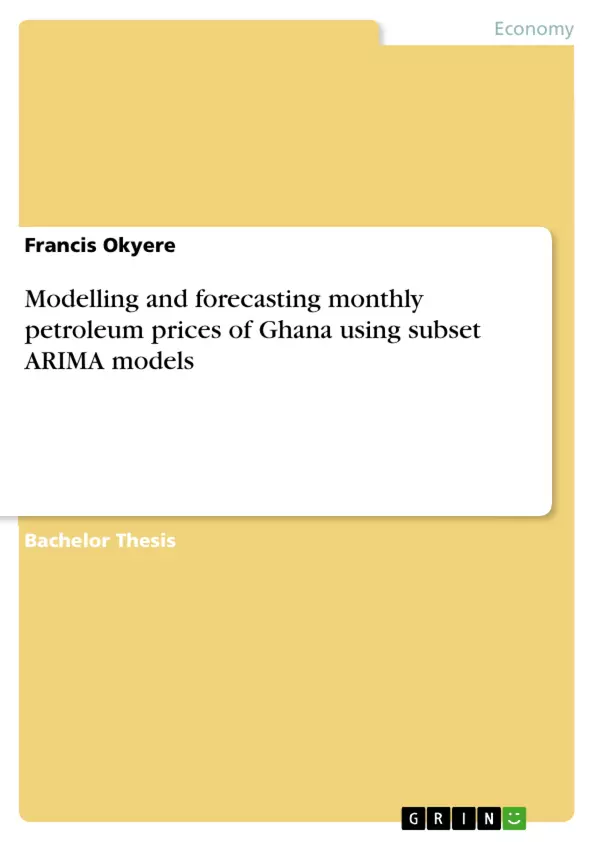
Modelling and forecasting monthly petroleum prices of Ghana using subset ARIMA models
Bachelorarbeit, 2012
104 Seiten, Note: none
Leseprobe
Table of Contents
- Chapter 1: Introduction
- 1.1 Background of the Study
- 1.2 Statement of Problem
- 1.3 Objectives of the Study
- 1.4 Research Questions
- 1.5 Significance of the Study
- 1.6 Scope of the Study
- Chapter 2: Related Review of Literature
- 2.1 Introduction
Objectives and Key Themes
The main objective of this study is to develop a univariate time series model to forecast monthly petroleum prices in Ghana for 2010/2011, using data from January 1990 to September 2010. This is driven by the National Petroleum Agency's (NPA) inability to effectively plan for petroleum price fluctuations. The study utilizes the Box-Jenkins methodology and SARIMA models to achieve this objective.
- Modeling and forecasting monthly petroleum prices in Ghana.
- Identifying factors influencing fuel prices in Ghana.
- Applying the Box-Jenkins methodology and SARIMA models for time series analysis.
- Evaluating the adequacy of the selected models.
- Predicting future petroleum price trends.
Chapter Summaries
Chapter 1: Introduction: This chapter sets the stage for the study by providing background information on the volatility of petroleum prices in Ghana and the limitations of the NPA's current planning strategies. It clearly states the problem of unpredictable petroleum prices and outlines the study's objectives, research questions, significance, and scope. The introduction highlights the need for accurate forecasting to improve economic planning and stability within the country.
Chapter 2: Related Review of Literature: This chapter explores existing research and literature related to petroleum price forecasting and the factors that influence these prices. It likely examines various modeling techniques, economic theories (such as supply and demand), and historical data analysis related to petroleum markets, particularly in the context of Ghana. This chapter provides the theoretical foundation upon which the study's methodology and analysis are built.
Keywords
Petroleum price forecasting, Ghana, SARIMA models, time series analysis, Box-Jenkins methodology, fuel prices, economic planning, demand and supply, crude oil prices.
Frequently Asked Questions: A Comprehensive Language Preview
What is the main objective of this study?
The primary goal is to create a univariate time series model for forecasting monthly petroleum prices in Ghana from 2010-2011, using data from January 1990 to September 2010. This addresses the National Petroleum Agency's (NPA) difficulty in planning for fluctuating petroleum prices.
What methodology is used in this study?
The research employs the Box-Jenkins methodology and SARIMA (Seasonal Autoregressive Integrated Moving Average) models to achieve its objective of petroleum price forecasting.
What are the key themes explored in this study?
Key themes include modeling and forecasting monthly petroleum prices in Ghana, identifying factors influencing fuel prices, applying the Box-Jenkins methodology and SARIMA models, evaluating model adequacy, and predicting future petroleum price trends.
What does Chapter 1 (Introduction) cover?
Chapter 1 provides background information on the volatility of petroleum prices in Ghana and the NPA's challenges in planning. It details the problem, objectives, research questions, significance, and scope of the study, highlighting the need for accurate forecasting for better economic planning.
What is the focus of Chapter 2 (Related Review of Literature)?
Chapter 2 examines existing research on petroleum price forecasting and influencing factors. It explores various modeling techniques, economic theories (supply and demand), and historical data analysis related to petroleum markets, particularly in Ghana, providing a theoretical foundation for the study's methodology.
What are the key words associated with this study?
Key words include petroleum price forecasting, Ghana, SARIMA models, time series analysis, Box-Jenkins methodology, fuel prices, economic planning, demand and supply, and crude oil prices.
What is the time period covered by the data used in this study?
The study utilizes data ranging from January 1990 to September 2010 to forecast petroleum prices for 2010/2011.
What is the significance of this study?
The study is significant because accurate petroleum price forecasting can improve economic planning and stability in Ghana, addressing a critical challenge for the National Petroleum Agency.
Details
- Titel
- Modelling and forecasting monthly petroleum prices of Ghana using subset ARIMA models
- Note
- none
- Autor
- Francis Okyere (Autor:in)
- Erscheinungsjahr
- 2012
- Seiten
- 104
- Katalognummer
- V215463
- ISBN (eBook)
- 9783656483625
- ISBN (Buch)
- 9783656483656
- Dateigröße
- 903 KB
- Sprache
- Englisch
- Schlagworte
- modelling ghana arima
- Produktsicherheit
- GRIN Publishing GmbH
- Preis (Ebook)
- US$ 32,99
- Preis (Book)
- US$ 43,99
- Arbeit zitieren
- Francis Okyere (Autor:in), 2012, Modelling and forecasting monthly petroleum prices of Ghana using subset ARIMA models, München, Page::Imprint:: GRINVerlagOHG, https://www.diplomarbeiten24.de/document/215463
- Autor werden
- Ihre Optionen
- Vertriebskanäle
- Premium Services
- Autorenprofil
- Textarten und Formate
- Services für Verlage, Hochschulen, Unternehmen

- © GRIN Publishing GmbH.
- Alle Inhalte urheberrechtlich geschützt. Kopieren und verbreiten untersagt.
- info@grin.com
- AGB
- Open Publishing
Der GRIN Verlag hat sich seit 1998 auf die Veröffentlichung akademischer eBooks und Bücher spezialisiert. Der GRIN Verlag steht damit als erstes Unternehmen für User Generated Quality Content. Die Verlagsseiten GRIN.com, Hausarbeiten.de und Diplomarbeiten24 bieten für Hochschullehrer, Absolventen und Studenten die ideale Plattform, wissenschaftliche Texte wie Hausarbeiten, Referate, Bachelorarbeiten, Masterarbeiten, Diplomarbeiten, Dissertationen und wissenschaftliche Aufsätze einem breiten Publikum zu präsentieren.
Kostenfreie Veröffentlichung: Hausarbeit, Bachelorarbeit, Diplomarbeit, Dissertation, Masterarbeit, Interpretation oder Referat jetzt veröffentlichen!
- GRIN Verlag GmbH
-
- Nymphenburger Str. 86
- 80636
- Munich, Deutschland
- +49 89-550559-0
- +49 89-550559-10
- info@grin.com
-









